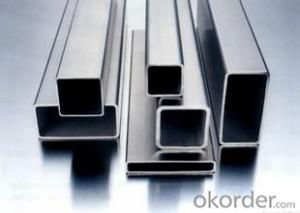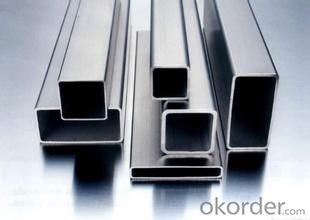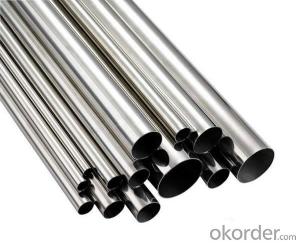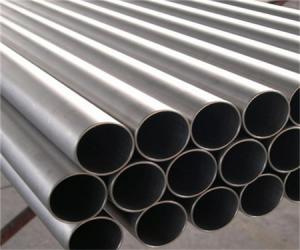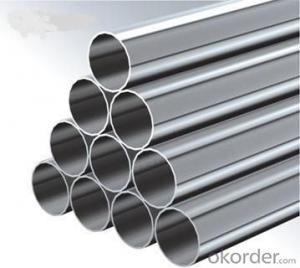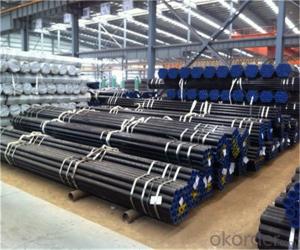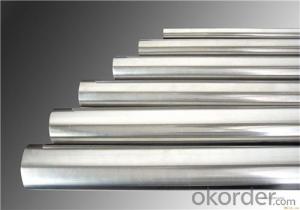Corrosion resistant 304 stainless steel tube
- Loading Port:
- Tianjin
- Payment Terms:
- TT OR LC
- Min Order Qty:
- 10 m.t.
- Supply Capability:
- 3000 m.t./month
OKorder Service Pledge
OKorder Financial Service
You Might Also Like
seamless steel pipe 304
1.Type:seamless
2.Standard:ASTM
3.Material Grand:304 stainless steel
4.Size:OD8-1000MM*WT0.5-80MM
seamless steel pipe 304
Standard: | JIS, AISI, ASTM, GB, DIN, EN | Place of Origin: | Zhejiang China (Mainland) | Brand Name: | SR |
Type: | Seamless | Steel Grade: | 300 Series | Certification: | ISO |
Thickness: | 0.8mm--22mm | Outer Diameter: | 20mm--800mm | process: | Cold drawn,cold roll |
product: | seamless pipe/tube,elbow,tee,reducer | MOQ: | 1000kg | standard: | A312/A213/A269/A249/A358/A268/A789/ |
Packaging & Delivery
Packaging Detail: | Standard seaworthy package(wooden boxes package,pvc package, and other package) |
Delivery Detail: | 5-30 days after confirmation of prepayment depending on quantity |
Tolerance | a) Outer Diameter: +/- 0.2mm b) Thickness: +/- 0.02mm c) Length: +/- 5mm |
Surface | 180G, 320G, 400G Satin / Hairline 400G, 500G, 600G or 800G Mirror finish and so on. |
Specification | ASTM A213,ASTM A312,ASTM A269,ASTM A778,ASTM A790,DIN 17456,DIN 17458,JIS G3459,JIS G3463 etc |
Material | TP304,TP304L,TP304H,TP304/304L,TP316,TP316L,TP316/316L,TP310,TP317, TP317L,TP321,TP321H,TP347,TP347H,S31803,S32205(Duplex),904L etc |
Application range | Stainless steel pipe applies to construction field, ships building industry, petroleum & chemicalindustries, war and electricity industries,food processing and medical industry, boiler heat exchanger,machinery andhardware fields. Stainless steel pipe can be made accordingto the customers requirements. |
Delivery conditions | Annealed, pickled & polished. |
Note | We can produce other standard as the customers’ requirement. |
- Q: What is the flexibility of steel pipes?
- Steel pipes possess exceptional flexibility, rendering them highly versatile and suitable for a wide array of applications. Their flexibility is derived from the inherent properties of steel, such as its high tensile strength and ductility, enabling them to bend and endure various forms of stress without breaking or deforming. The structural integrity of steel pipes remains intact even when bent or shaped into different forms. This facilitates simpler installation and routing around obstacles, making them more adaptable for intricate plumbing or piping systems. Furthermore, the flexibility of steel pipes allows them to withstand external forces like ground movements or temperature fluctuations without sustaining significant damage. Moreover, the flexibility of steel pipes makes them ideal for applications that involve dynamic movement or expansion. In the case of oil and gas pipelines or heating and cooling systems, where temperature variations can lead to expansion and contraction, steel pipes can accommodate these changes without causing leaks or failures. Additionally, the flexibility of steel pipes contributes to their durability and longevity. The ability to endure bending and stress prevents the formation of cracks or fractures that could result in leaks or structural failures. This characteristic establishes steel pipes as a dependable choice for demanding environments, including high-pressure systems or corrosive conditions. To sum up, the flexibility of steel pipes is a crucial attribute that allows for effortless installation, adaptability to diverse conditions, and long-term reliability. Due to their remarkable flexibility, steel pipes are extensively preferred in numerous industries and applications where strength, durability, and versatility are paramount.
- Q: Are steel pipes resistant to ultraviolet (UV) radiation?
- No, steel pipes are not inherently resistant to ultraviolet (UV) radiation.
- Q: How are steel pipes used in the construction of industrial facilities?
- Steel pipes are commonly used in the construction of industrial facilities for various purposes such as transporting fluids, gases, and steam, as well as providing structural support and carrying electrical wiring. They are durable, resistant to corrosion, and can withstand high pressure and temperature, making them ideal for industrial settings.
- Q: What are the different methods of protecting steel pipes from external damage?
- There are several methods of protecting steel pipes from external damage, including coating the pipes with a corrosion-resistant material such as epoxy or polyethylene, applying a layer of protective tape, installing a cathodic protection system, using concrete or rock shielding, and implementing measures to prevent soil movement or impact damage.
- Q: Can steel pipes be used for underground geothermal systems?
- Yes, steel pipes can be used for underground geothermal systems. Steel pipes are commonly used in geothermal systems due to their strength and durability. They can withstand the high temperatures and pressures associated with geothermal energy extraction and distribution. Steel pipes also have good corrosion resistance, which is important when dealing with the underground environment and the various minerals and chemicals present in the ground. Additionally, steel pipes are versatile and can be easily joined and installed underground, making them a suitable choice for geothermal systems.
- Q: Why seamless steel pipe called seamless steel pipe?
- Seamless steel pipe is a hollow section, without the joint round, square, rectangular steel. Seamless steel tubes are made of ingots or billets made by piercing and are then made by hot rolling, cold rolling or cold casting. Seamless steel pipe with a hollow section, as pipe conveying fluid, compared withsteel and roundsteelinsolid, flexural torsional strength in the same time, the weight is light, is a kind of economic section steel, widely used in the manufacture of structural parts and mechanical parts, such as the oil pipe, automobile transmission shaft, bike frame and construction using steel scaffolding.
- Q: What is the outer diameter and wall thickness of DN40 steel pipe?
- DN40, refers to the diameter of 40mm, that is, an inch and a half, there are welded pipe and galvanized pipe,Ordinary wall thickness 3.5mm wt 3.84kg/mThicken 4.25mm weight 4.58kg/m
- Q: What are the factors affecting the pressure rating of steel pipes?
- The factors affecting the pressure rating of steel pipes include the thickness and strength of the pipe material, the diameter and length of the pipe, the temperature of the fluid being transported, the type of fluid, and the presence of any corrosive substances or external loads.
- Q: What is the cost of steel pipes?
- The cost of steel pipes can vary depending on factors such as size, grade, and quantity. It is best to contact suppliers or check online platforms to get specific pricing information for the type of steel pipes you require.
- Q: What are the different types of expansion joints used with steel pipes?
- There are several types of expansion joints used with steel pipes, including bellows expansion joints, universal expansion joints, hinged expansion joints, and gimbal expansion joints. These expansion joints are designed to accommodate the movement and thermal expansion of steel pipes, ensuring their integrity and preventing damage.
Send your message to us
Corrosion resistant 304 stainless steel tube
- Loading Port:
- Tianjin
- Payment Terms:
- TT OR LC
- Min Order Qty:
- 10 m.t.
- Supply Capability:
- 3000 m.t./month
OKorder Service Pledge
OKorder Financial Service
Similar products
Hot products
Hot Searches
Related keywords
